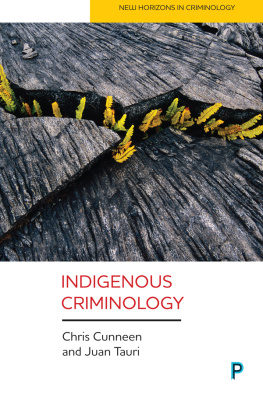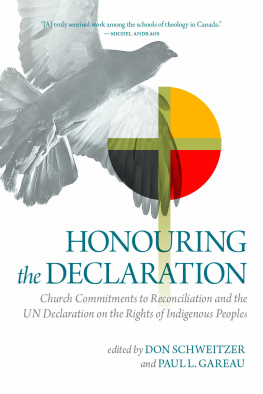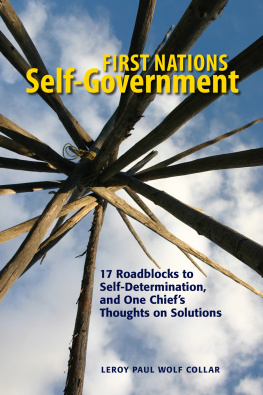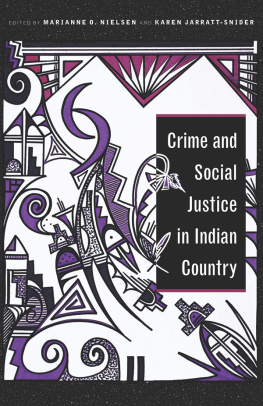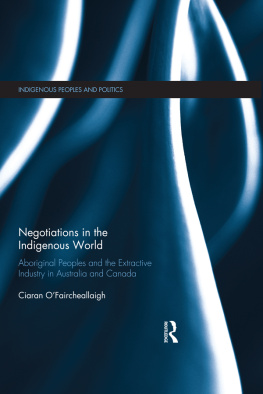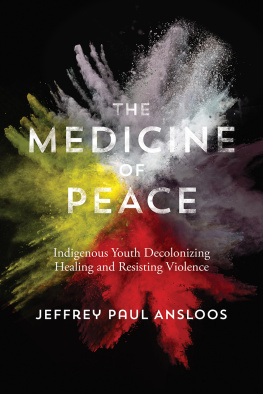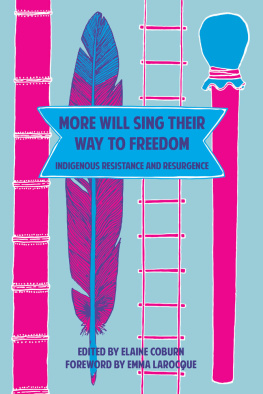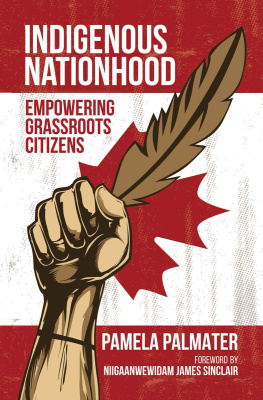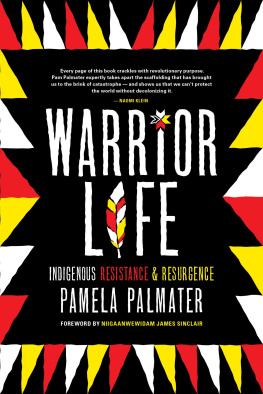Table of Contents
Guide
Page List
Copyright University of Toronto Press 2016
Higher Education Division
www.utppublishing.com
All rights reserved. The use of any part of this publication reproduced, transmitted in any form or by any means, electronic, mechanical, photocopying, recording, or otherwise, or stored in a retrieval system, without prior written consent of the publisheror in the case of photocopying, a licence from Access Copyright (Canadian Copyright Licensing Agency), One Yonge Street, Suite 1900, Toronto, Ontario M5E 1E5is an infringement of the copyright law.
Library and Archives Canada Cataloguing in Publication
Monchalin, Lisa, 1981, author
The colonial problem : an Indigenous perspective on crime and injustice in Canada / Lisa Monchalin.
Includes bibliographical references and index.
Issued in print and electronic formats.
ISBN 978-1-4426-0805-4 (bound).ISBN 978-1-4426-0662-3 (paperback).ISBN 978-1-4426-0663-0 (pdf).ISBN 978-1-4426-0664-7 (html).
1. Native peoplesCultural assimilationCanada.2. Native peoplesColonizationCanada.3. Native peoplesCanadaSocial conditions.4. Native peoplesCrimes againstCanada.5. Native peoplesLegal status, laws, etc.Canada.6. Native peoplesCanadaGovernment relations.7. Criminal justice, Administration ofCanada.I. Title.
E78.C2M59 2015305.897'071C2015-903725-5
C2015-903726-3
We welcome comments and suggestions regarding any aspect of our publicationsplease feel free to contact us at .
North America
5201 Dufferin Street
North York, Ontario, Canada, M3H 5T8
2250 Military Road
Tonawanda, New York, USA, 14150
ORDERS PHONE : 18005659523
ORDERS FAX : 18002219985
ORDERS E-MAIL :
UK, Ireland, and continental Europe
NBN International
Estover Road, Plymouth, PL6 7PY, UK
ORDERS FAX : 44 (0) 1752 202333
ORDERS PHONE : 44 (0) 1752 202301
ORDERS E-MAIL :
Every effort has been made to contact copyright holders; in the event of an error or omission, please notify the publisher.
This book is printed on paper containing 100% post-consumer fibre.
The University of Toronto Press acknowledges the financial support for its publishing activities of the Government of Canada through the Canada Book Fund.
Printed in the United States of America
The Colonial Problem
Acknowledgements
Kwey Kwey. Lisa Monchalin nidijinikz. Niagara Nidonjab. I am grateful to the land in which I live, work, and play and to which I wrote this book. The majority of the writing took place in the shared traditional unceded territories of Kwantlen, Katzie, Semiahmoo, and Tsawwassen, where I currently reside. Some parts were also written while I was living on unceded Algonquin territory.
The completion of this book would not have been possible without the unwavering support of several friends, family members, and colleagues. My sister Rene Monchalin was always a phone call away, ready at any time to talk through ideas or concepts. Rex Turna proofread an early draft. Nadine Pluzak spent countless hours of her time proofreading and providing many thoughtful comments. I am extremely thankful for all of this wonderful help, love, and support.
Another big thank you goes to Sino General, Shelly Hill, Melinda Bige, Shylo Pruyn and Jerilynn Snuxyaltwa Webster who all continued to provide their words of encouragement throughout the writing phase. I wish to also thank to my PhD supervisor and mentor Irvin Waller, who provided invaluable guidance and support. I want to acknowledge also the outstanding reviewers Greg Younging, Wenona Victor, Jennifer Dalton, and Rob Nestor, as well as the blind reviewers, who provided exceptional and helpful feedback that shaped this book. The time and energy you gave are much appreciated, and your thought-provoking comments and suggestions were extremely valuable.
I am grateful for the time, experiences, opinions, and stories shared by Darrell Bob, Robert Shintah, Kim Baird, Dan General, Ian Campeau, and Bear Witness, which helped shape parts of this book. I am also appreciative of the time and comments provided by Jeff Corntassel and Taiaiake Alfred. They graciously had me out to the University of Victoria, where they provided outstanding comments, feedback, conversation, and support for which I am forever grateful.
A special thanks goes to my friends and colleagues at Kwantlen Polytechnic University. Jeff Shantz, Chuck Reasons, Michael Ma, Hisham Ramadan, Seema Ahluwalia, Mike Larsen, Wade Deisman, Jane Miller-Ashton, and Dave Lyon warrant notable mention, as they provided intellectual guidance and keen support throughout the project. A special thank you goes to Darlene Willier who has provided guidance, advice, and insightful conversation. I would also like to express gratitude to my previous colleague Stephen Dooley, who has been a great friend and mentor during this process.
Thank you to Jackie Traverse for her amazing artwork that is on the cover of this book. I would also like to thank Karen Taylor who did an outstanding job copyediting this book. Thank you to Jesse Thistle for his outstanding advice on certain historical terminology.
A big thank you is also deserved for the Pow Wow community. Dancing helped carry me through this project. The laughter, friendship, and healing in the Pow Wow circle has been key to this books completion. When I needed a break, I would dance, laugh, and socialize with this amazing circle of friends and family. Finally, a big meegwetch to my ancestors who have been with me every step of the way as I danced to heal, listened and watched to learn, and taught and wrote to try to make a difference for our future generations.
The Colonial Problem:
An Indigenous Perspective on Crime and Injustice in Canada
Lisa Monchalin

Illustrations
Figures
Images
Table
For Grandma Monchalin. She explained that, upon her first sight of me when I was born, she felt that I would make a difference for our peoples. This is one of my attempts, so I dedicate this book to her, as part of trying to walk this path.
Note to Instructors
I am of mixed descent, a combination of Algonquin, Mtis, Huron, and Scottish. I feel just as much Algonquin as I do Mtis, and just as much Huron as I do Scottish, and just as much Mtis as I do Huron, and so on. I was born in St. Catharines, Ontario, and grew up in the Niagara Region of that province (having been raised mainly in Haudenosaunee and Neutral traditional territory there). I received a rowing scholarship in 2001 to attend Eastern Michigan University on Chippewa, Ottawa, Potawatomi, and Wyandot shared territories (Ypsilanti, Michigan) where I did my bachelors and masters degrees in criminology. In 2006, I moved to Algonquin territory (Ottawa, Ontario) where I did my PhD in criminology at the University of Ottawa. I now live in Kwantlen, Katzie, Semiahmoo, and Tsawwassen shared territories (Surrey, British Columbia) and teach at Kwantlen Polytechnic University in the Criminology Department. I am subject to my own experiences, teachings, and research.
Whether Indigenous, non-Indigenous, mixed, or undefined, everyone is welcome to use and read this book to pursue education and learning; exclusion has never been part of Indigenous cultures. If one attempts to teach or learn about cultures and knowledges other than ones own, situating oneself is a first step. This step includes self-reflecting on personal standpoints and acknowledging bias. However, a person trying to learn Indigenous cultures or realities from a book will have an incomplete knowledge of them. These cultures and realities must be lived and experienced. Good intentions are useful when one learns and teaches outside of the context of lived experience, but many horrible atrocities throughout the world were done with the best of intentions. Consequently, an acknowledgement of difference and of limitation is due when someone is teaching about or informing others on another groups culture or realities. And those not from Indigenous cultures must consult people with lived experience of those cultures.


